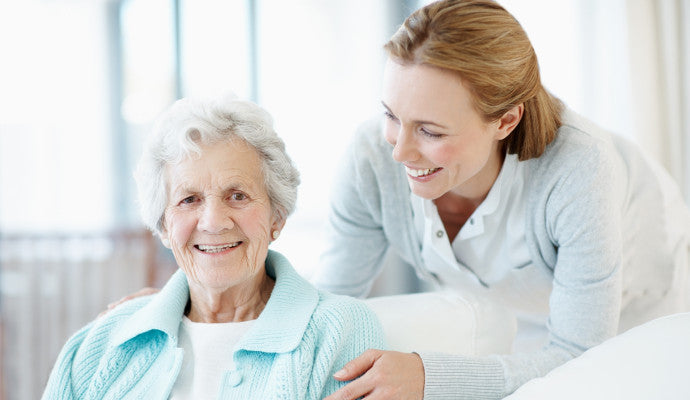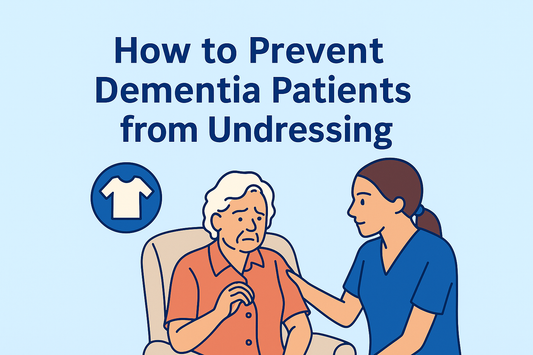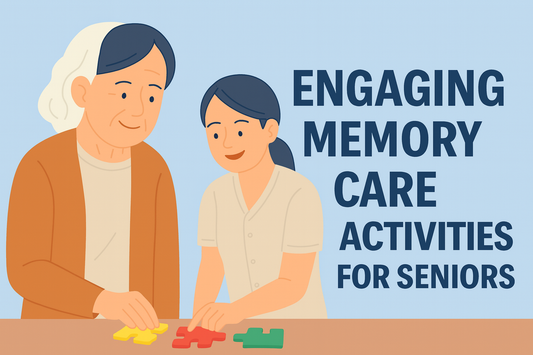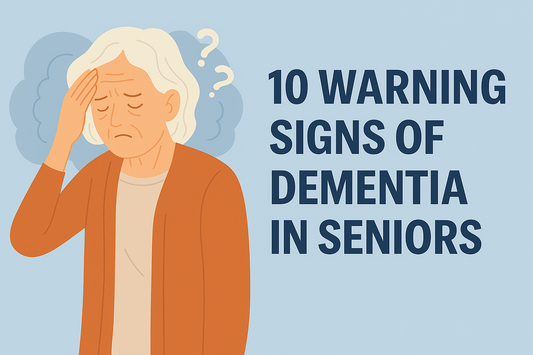
Bathroom Issues and Alzheimer's or Dementia
If your loved one has Alzheimer’s or any form of dementia, it is inevitable that at some point during the progression of their disease, they will have bathroom issues. How it actually begins may vary from person to person, but caregivers should be ready for the patient to increase and evolve until they become fully unable to use the bathroom. Fortunately, in today’s time, there are a number of ways to manage this in order to ensure that your loved one remains comfortable as well as the makes the task of caregiving easier.
QUICK LINKS - TOPICS COVERED:
What is Incontinence?

Incontinence is a term used to describe bathroom issues that a person may have. It includes any accidental or involuntary loss of urine from the bladder or bowel motion, feces, or wind from the bowel. The condition ranges in severity from minor involuntary leaks to complete loss of bladder or bowel control.
There are two distinct categories of incontinence, urinary incontinence and bowel incontinence.
Urinary Incontinence
This condition occurs due to problems with the muscles and nerves that help the bladder hold or release urine. There are give basic types of incontinence:
- Stress incontinence
- Urge incontinence
- Mixed incontinence
- Overflow incontinence
- Functional incontinence
Bowel Incontinence
People with this condition usually have trouble controlling their bowels. It means they may pass feces or stools at the wrong time or in the wrong place. They may also pass wind when they don’t mean to or experience staining of their underwear. About one in 20 people experience poor bowel control and becomes more common as people get older. Often, bowel incontinence appears together with urinary incontinence.
Incontinence & Dementia
For dementia patients, the incontinence they will experience falls under the category of functional incontinence. It is when some medical conditions keep a person from getting to the bathroom in time or cause the person to lose control of their bladder.
For some people, incontinence develops because messages between the brain and the bladder or bowel don’t work properly. They may not recognize that they have a full bladder or bowel, or be able to control them. Other reasons include:
- Not reacting quickly enough to the sensation of needing to use the toilet
- Not getting to the toilet in time—due to limited mobility, for example
- Not being able to tell the caregiver that they need to go to the toilet due to difficulty in communication
- Not understanding a prompt from someone to use the toilet
- Not being able to find, recognize, or use the toilet—if someone becomes confused about their surroundings, they may end up urinating or releasing a bowel movement in an inappropriate place because they mistake it for a toilet
- Not being able to, or forgetting how to, do things needed to use the toilet such as undoing clothing, not letting others help, or simply refusing to use the toilet—this could be due to embarrassment or not understanding an offer for help.
- Not making any not making any attempt to find the toilet—this could be due to depression, a lack of motivation, or because the person is distracted
- Embarrassment after an accident, which the person unsuccessfully tries to manage. For example, they may try to hide wet or soiled clothes at the back of a drawer to deal with later, and then forget they’ve put them there.
Managing Incontinence
The ways to manage incontinence with an Alzheimer’s or dementia patient can vary depending on the stage of progression they are at. If your loved one has only started to experience incontinence, they may only need some assistance from a caregiver to get to a bathroom. But as the disease progresses, they will eventually become completely dependent on a caregiver to manage all their toileting needs. Below are some tips on managing incontinence:
Maintain Bladder Health
There are a number of causes of incontinence that are easily curable. For example, UTIs (urinary tract infections), constipation, or prostate problems. These medical conditions are often easily curable with the help of medication and other solutions. On the other hand, in some cases, certain medications (sleeping pills, anti-anxiety drugs) or diuretics (caffeinated drinks such as coffee, tea, carbonated beverages) can also lead to incontinence.
Therefore it’s important to find a balanced way of maintaining bladder health. Below are a number of things that can be done in order to do that:
- Avoid carbonated or caffeinated beverages – they contain diuretics which can increase the frequency of urination, thereby increase the risk of incontinence.
- Limit liquids before bed – to ensure that the likelihood of accidents occurring over the night is reduced.
- BUT don’t limit liquids during the day – adequate fluid intake during the day keeps the bladder and bowel healthy.
- Avoid acidic or spicy food – they can irritate the urinary tract.
- Eat foods containing fiber – helps to avoid constipation.
- Exercise regularly – maintaining good physical health can also keep the bladder muscles strong.
Reduce Accidents
The first step to reducing the number of accidents is to limit the consumption of liquids at least a couple of hours before bed time. Another idea is to schedule nighttime toilet trips. Although it is not a complete solution, it can help to avoid soiled sheets. The method involves waking up your loved one at one point during the night to urinate. Care should be taken that these nighttime bathroom breaks are not scheduled at the same time every night. Otherwise, the bladder may grow accustomed to emptying itself during a specific time of the night.
Be Respectful
Being or becoming incontinence is emotionally challenging. This is especially so for those with dementia as they slowly lose their independence. It’s important for you and any caregiver for your loved one to be respectful. They should never feel embarrassed or like they’re being talked down on.
If accidents occur despite best efforts, be careful to not hurt your loved one’s feelings. Do not highlight or draw more attention to the accident. Instead, go about cleaning up the place without exchanging any negative words.
Encourage Use of Toilet
If your loved one is in the middle to late stages of dementia, they are likely to forget about going to the toilet or may not realize it until it’s too late. Gently remind them to go to the bathroom at regular intervals. However, remember to be polite and respectful when communicating this to them.
Make it Easy to Find the Toilet
For dementia patients, sometimes their own home may seem like a strange new place at times. Finding the toilet may become challenging. To help them find the toilet with ease, you can consider some of the following:
- Clear the path to the bathroom
- Keep the bathroom door open
- Use signs & markers on the floor and doors
- Use lights to guide them to the bathroom
- Remove any door locks
- Use contrasting color in the bathroom
Establish Toileting Schedule
Routine is very important for those who have dementia. It applies for toileting as well. Try to keep track of your loved one’s toilet use throughout the day and identify any patterns that may emerge. Based on those patterns, try to plan ahead and establish a toileting schedule. Whether or not they have the urge to urinate, getting them to empty their bladder at regular timings can keep the bladder from becoming too full and avoid accidents.
Toilet Friendly Clothing
One of the main things that become collateral damage when dealing with incontinence is soiled clothing. When managing incontinence, it is best to adapt your loved one’s clothing to the new situation. Choose clothes that are easy to wash, has zippers or Velcro closures, and shoes without laces. Any item of clothing they wear should be easy to get in and out of.
Use Incontinence Products
Although the first incontinence product that comes to mind for most people are adult diapers, there are many other types of products available that can help too. These include:
- Protective underwear – also known as adult diapers, there are many different types and styles available to suit varying levels of incontinence. Some look like a larger version of infant diapers with tabs on the sides, while others look more similar to sanitary pads with adhesive strips on the bottom to stick onto underwear. And there are some that look exactly like regular underwear but have extra absorption capabilities. The exact type of product that will suit your loved one depends on the progress of their dementia and the severity of incontinence.
- Portable toilet – can be useful especially during the night when the bathroom can be extra challenging to find for your loved one.
- Washable bed pads – even when diapers are being used during nighttime, accidents can still happen. To manage it, use washable mattress protector-like bed pads designed for extra absorption.
- Seat protector – if bed pads are meant to be used on your loved one’s bed during nighttime, then seat protectors are meant to be used during the day on any chair or surface that your loved one may sit at.
The exact type of incontinence product that is suitable for your loved one will change over time. What works now may not work at a later stage. It is important to keep this in mind and adapt the types of incontinence products used for your loved one as their needs change.



